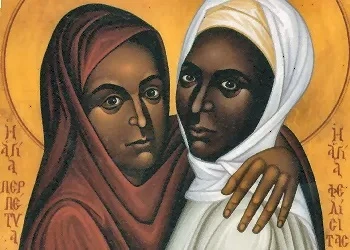President Donald Trump is waging war on diversity, equity, and inclusion (DEI) programs. Many argue that DEI is a religion in itself, complete with sacraments, dogmas, and heretics. It demands faith, repentance, and retribution. It even has its own version of original sin — privilege — and its unique concept of salvation — allyship. Nonetheless, it’s entirely incompatible with Christianity.
There’s a strange irony in watching progressives declare that rejecting DEI is somehow un-Christian. A recent MSNBC article by Guthrie Graves-Fitzsimmons leans hard into this claim, insisting that DEI is a natural outgrowth of the Gospels. But it’s not. DEI does not preach love. On the contrary, it preaches resentment. It does not promise redemption. Instead, it promises endless guilt. It does not offer grace; it demands retribution. It is, I argue, the opposite of Christianity in every meaningful way.
It’s important to note that Graves-Fitzsimmons is not a neutral commentator. Far from it.
He’s the senior director of policy and advocacy at Interfaith Alliance, a national organization that advocates for “inclusive democracy” and firm boundaries between religion and government. His argument rests on the premise that social justice movements like DEI are modern manifestations of biblical teachings. However, in doing so, he commits several cardinal errors, such as confusing Christian charity with bureaucratic coercion, personal mercy with institutionalized grievance, and faith in Christ with faith in diversity officers.
As any honest observer can confirm, DEI programs don’t unite people. They do the opposite. They drive people apart, dividing them into factions based on grievances. They tally up historic wrongs, then assign moral worth accordingly. If DEI is a religion, it focuses on scorekeeping. On the other hand, Christianity preaches that in Christ, “there is neither Jew nor Greek, slave nor free, male nor female” (Galatians 3:28). The Gospel erases divisions; DEI cements them.
The MSNBC article claims you “can’t read the Gospels and not come away with a strong sense of God’s preference for diversity, equity, and inclusion.” Having read the Gospels, I beg to differ. Christ did not come to preach “inclusion” in the modern progressive sense. He came to call sinners to repentance. The Pharisees were “included” in Christ’s presence, but they weren’t given a free pass for their hypocrisy. Inclusion without genuine transformation is utterly meaningless.
Christianity was not founded on quotas or social engineering; DEI was. Its proponents argue that, irrespective of their individual circumstances, a wealthy minority student at Harvard is inherently oppressed, while a working-class white Christian from Appalachia is an oppressor.
At its core, DEI is about power — who gets it, who loses it, and who must atone for the past. It teaches that history is an unbroken chain of oppression and that the only way forward is to dismantle existing structures. DEI is obsessed with the redistribution of authority and the enforcement of ideological purity. Christianity, in its purest form, teaches the very opposite. Christ did not tell the poor to seize power from the rich. He told them, “Blessed are the meek, for they shall inherit the earth” (Matthew 5:5). He did not tell his followers to demand reparations; he told them to forgive “seventy times seven” (Matthew 18:22).
DEI offers no such path to forgiveness. Once accused, as many victims of the anti-merit madness will tell you, there is no redemption. Absolution is impossible. There is only confession, struggle sessions, and perpetual shame. Flagellation, including self-flagellation, is mandatory. This ideology thrives on endless recrimination, keeping old wounds open instead of healing them. Christianity offers a compelling alternative: mercy.
The MSNBC piece insists that Georgetown University’s Jesuit tradition supports DEI. But, if we are being completely honest, Georgetown, like many other elite institutions, has long since abandoned Christian principles in favor of progressive politics. When institutions attempt to disguise DEI in Christian language, they aren’t defending faith. They’re co-opting it; they’re corrupting it.
The early Christians didn’t have time to enforce diversity quotas. They were — you know — too busy being persecuted, tortured, and executed for their faith. Yet, they prayed for their enemies, spread the Gospel, and transformed the world through compassion, not coercion. Compare that to modern DEI crusaders, who seek to impose compliance through corporate mandates, government policies, and professional blacklists.
The most obvious difference between Christianity and DEI is whom followers worship. Christianity teaches that our primary identity is as children of God. DEI asserts that our defining trait is tied to the unholy trinity of race, gender, and sexual orientation. Christianity teaches that our sins can be forgiven and that we can be made new. DEI teaches that some are irredeemable because of their privilege, while others are perpetual victims with no personal responsibility. Moreover, DEI focuses on superficial characteristics, while Christianity is more concerned with the soul. These are not small differences; they are foundational contradictions.
Christians can follow the Gospel, which calls for unity and faith in something greater than themselves, or they can follow DEI, which demands resentment, division, and faith in a pathetic priesthood of diversity officers.
They cannot follow both.






![Trump's Admin Guts Another ‘Rogue Government Agency with Zero Accountability’ [WATCH]](https://www.right2024.com/wp-content/uploads/2025/03/Trumps-Admin-Guts-Another-‘Rogue-Government-Agency-with-Zero-Accountability-350x250.jpg)

![‘We All Owe Him (Elon) a Huge Debt of Gratitude’ [WATCH]](https://www.right2024.com/wp-content/uploads/2025/03/‘We-All-Owe-Him-Elon-a-Huge-Debt-of-Gratitude-350x250.jpg)








